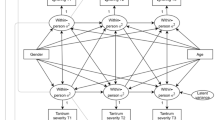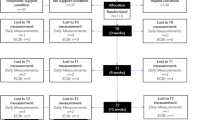Abstract
A placebo by proxy effect occurs when a patient’s response to therapy, assessed either objectively or subjectively, is affected by the behavior of other people who know that the patient is undergoing therapy. We recruited 58 children aged 2–5 years who reported frequent tantrums and examined the effect of a pharmacologically inert substance (flower essence) that is purported by the manufacturers to reduce temper tantrums. Tantrum frequency, tantrum severity, and parental mood were measured on 5 occasions over 8 days before treatment and on a further 5 occasions over 10 days after the start of treatment. Compared to the period before treatment, there was a continuing reduction in tantrum frequency (p = .002) and severity (p = .003) over the 8 days of placebo treatment. There were significant day-to-day correlations between parents’ mood and tantrum frequency (r = .23) and severity (r = .19). Children’s response to treatment for tantrums is associated with the beliefs and mood of the adult carer. We cannot say whether tantrum reduction was due to objective changes in child behavior, changes in parental perception, or both, but both are clinically important changes.

Similar content being viewed by others
References
Durlak, J. A. (2009). How to select, calculate, and interpret effect sizes. Journal of Pediatric Psychology, 34, 917–928.
Ernst, E. (2010). Bach flower remedies: A systematic review of randomized clinical trials. Swiss Medical Weekly, 140. doi:10.4414/smw.2010.13079
Grelotti, D., & Kaptchuk, T. J. (2011). Placebo by proxy. BMJ, 343:bmj.d4345BMJ. doi:10.1136/bmj.d4345
Hoover, D. W., & Milich, R. (1994). Effects of sugar ingestion expectancies on mother-child interactions. Journal of Abnormal Child Psychology, 22, 501–515.
Hyland, M. E. (2011). Motivation and placebos: Do different mechanisms occur in different contexts? Philosophical Transactions of the Royal Society B: Biological Sciences, 366, 1828–1837.
Hyland, M. E., & Whalley, B. (2008). Motivational concordance: An important mechanism in self-help therapeutic rituals involving inert (placebo) substances. Journal of Psychosomatic Research, 65, 405–413.
Hyland, M. E., Whalley, B., & Geraghty, A. W. A. (2007). Dispositional predictors of placebo responding: A motivational interpretation of flower essence and gratitude therapy. Journal of Psychosomatic Research, 62, 331–340.
McDonald, R., Jouriles, E. N., Briggs-Gowan, M. J., Rosenfield, D., & Carter, A. S. (2007). Violence toward a family member, angry adult conflict, and child adjustment difficulties: Relations in families with 1- to 3-year-old children. Journal of Family Psychology, 21, 176–184.
Moerman, D. E. (2002). Meaning, medicine, and the ‘placebo effect’. Cambridge: Cambridge University Press.
Potegal, M., & Davidson, R. J. (2003). Temper tantrums in young children: 1. Behavioral composition. Journal of Developmental and Behavioral Pediatrics, 24, 140–147.
Rabe-Hesketh, S., & Skrondal, A. (2008). Multilevel and longitudinal modeling using stata. College Station, TX: Stata Press.
Scarborough, A. A., Hebbeler, K. M., Spiker, D., & Simeonsson, R. J. (2007). Dimensions of behavior of toddlers entering early intervention: Child and family correlates. Infant Behavior Development, 30, 466–478.
Strand, P. S. (2000). A modern behavioral perspective on child conduct disorder: Integrating behavioral momentum and matching theory. Clinical Psychology Review, 20(5), 593–615.
Waschbusch, D. A., Pelham, W. E., Jr., Waxmonsky, J., & Johnston, C. (2009). Are there placebo effects in the medication treatment of children with attention-deficit hyperactivity disorder? Journal of Developmental and Behavioral Pediatrics, 30, 158–168.
Whalley, B., & Hyland, M. E. (2009). One size does not fit all: Motivational predictors of contextual benefits of therapy. Psychology and Psychotherapy, 82, 291–303.
Acknowledgments
The flower essences used in this study were provided without cost to the authors by the Green Man Essence Company. The study was unfunded.
Conflict of interest
There is no conflict of interest.
Author information
Authors and Affiliations
Corresponding author
Appendix
Appendix
Verbatim email responses to follow up question to parents (typographical errors not corrected).
-
1.
We didn’t tell our little boy about the essences—he wasn’t even 2 and a half when we started. However, fingers crossed the tantrums and hitting has reduced by about 80 % so I would say a definite success for us.
-
2.
Please feel free to use my comments i have told so many people about this and they can’t wait for it to come out on the market. Please let me know where i can purchase some more 4 my son (name). (name) has one tablet a day now, you can tell the difference in his behavior if we have forgotton to give him one. I think this stuff is amazing.
-
3.
The first time I gave the flower essence I caused a tantrum—he took the capsule and then asked for ‘more sweetie’. When I said ‘no’ he had a tantrum shouting ‘MORE SWEETIE’!!! He did eventually accept he was only going to get one at a time.
-
4.
I did not tell my child, infact I told her it was a vitamin…I stopped the “viamins” about 6 weeks ago and found little tantrums coming back, not as long as before though, and mostly when shes tired.
-
5.
I can quite honestly say that these remedies changed our life! It took 2 weeks. After the first 10 days or so my daughter started to have problems sleeping. She wasn’t unhappy, just very awake. So I reduced the pills to just one in the morning and instantly she slept better at night.
The first remedy I gave her changed her instantly, but this only lasted for about 3/4 of an hour—but it was the first time I’d seen my daughter actually relax—I could see it in her face, I’d never seen it before—only in her older sister who seems relaxed all the time! After that had worn off it took a couple of days for her to find out for herself how she should be, she seemed to be allowed to learn that being more placid was a happier and greater place to be.
After 2 weeks she didn’t need them anymore. However, about 7 weeks or so later she was very ill with flu like symptoms for just over a week, and as she recovered from that she started to resort back to her old ways again of anger and frustration. I started giving her a remedy in the morning for 3 days and she settled down instantly. That was the 2nd–3rd week of October and she hasn’t needed anything since.
I’d love to know what’s in them. But, whatever it was, please take it from a mother who was at her limits—they work. And you are brilliant to want to concentrate on this as part of your studies.
Well done and good luck in whatever else you choose to do.
-
6.
We have been thrilled at the results the pills had on our 4 year old son (name). Not sure if it was a combination of starting school along with the pills that made them especially effective but we are definitely intending to buy some more as we are now near the end of the supply!
-
7.
Love these three questions, as the one comment I wanted to make was (relevant and) that the tablets seemed to help with my child’s tantrums. I feel that this COULD have been purely through placebo effect as I had told him they were going to help. Or it could have been because they had an ingredient that calmed him? Nevertheless-does this really matter too much? The desired effect is to cease or reduce the child’s tantrum/s. As a parent, I don’t really care too much how this is achieved if it involves an unharmful substance. I feel children (or in any case my child) tantrum/s primarily to gain attention from their carer. If a parent taking the time to administer a herbal tablet to the child satisfies that child’s need for attention (thus ceasing the tantrum) then great. If it works because of it’s specially selected ingredients then great too. But it does make a difference.
Rights and permissions
About this article
Cite this article
Whalley, B., Hyland, M.E. Placebo by proxy: the effect of parents’ beliefs on therapy for children’s temper tantrums. J Behav Med 36, 341–346 (2013). https://doi.org/10.1007/s10865-012-9429-x
Received:
Accepted:
Published:
Issue Date:
DOI: https://doi.org/10.1007/s10865-012-9429-x




